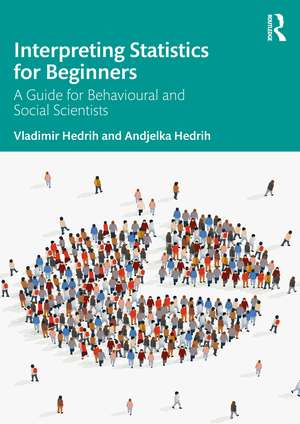Interpreting Statistics for Beginners: A Guide for Behavioural and Social Scientists
Autor Vladimir Hedrih, Andjelka Hedrihen Limba Engleză Paperback – 25 feb 2022
| Toate formatele și edițiile | Preț | Express |
|---|---|---|
| Paperback (1) | 280.14 lei 3-5 săpt. | +18.51 lei 4-10 zile |
| Taylor & Francis – 25 feb 2022 | 280.14 lei 3-5 săpt. | +18.51 lei 4-10 zile |
| Hardback (1) | 1002.99 lei 6-8 săpt. | |
| Taylor & Francis – 25 feb 2022 | 1002.99 lei 6-8 săpt. |
Preț: 280.14 lei
Nou
53.61€ • 55.76$ • 44.26£
Carte disponibilă
Livrare economică 25 martie-08 aprilie
Livrare express 08-14 martie pentru 28.50 lei
Specificații
ISBN-10: 0367618524
Pagini: 204
Ilustrații: 40 Tables, black and white; 40 Halftones, black and white; 40 Illustrations, black and white
Dimensiuni: 174 x 246 x 20 mm
Greutate: 0.35 kg
Ediția:1
Editura: Taylor & Francis
Colecția Routledge
Locul publicării:Oxford, United Kingdom
Public țintă
Undergraduate CoreNotă biografică
Dr. Andjelka Hedrih is a research assistant professor at the Mathematical Institute of the Serbian Academy of Sciences and Arts. She is a medical doctor who holds a PhD in Biomedical engineering and technologies. She is the author of a number of published papers on mathematical modelling of biological systems.
Recenzii
'Understanding statistics means being able to make grounded conclusions about the phenomena that surround us, and this book is a means to it. Starting from basic statistical concepts and ending in correlations and difference testing, this book is an excellent primer on essential statistical knowledge. Thanks to its clarity and practical examples included, this book is easy to read and understand, which makes it appealing for various readers. This book approaches main statistical concepts in an accessible and understandable way and is an extremely valuable reading for students, professionals, and researchers. I am sure that a wide audience will find this book as ‘a must have’ in their regular work.'
'Understanding statistics means being able to make grounded conclusions about the phenomena that surround us, and this book is a means to it. Starting from basic statistical concepts and ending in correlations and difference testing, this book is an excellent primer on essential statistical knowledge. Thanks to its clarity and practical examples included, this book is easy to read and understand, which makes it appealing for various readers. This book approaches main statistical concepts in an accessible and understandable way and is an extremely valuable reading for students, professionals, and researchers. I am sure that a wide audience will find this book as "a must have" in their regular work.'
Dr. Iva Sverko, Institute of Social Sciences Ivo Pilar, Zagreb, Croatia
Cuprins
1. Scientific paradigms and scientific explanations, pseudoscience
2. Basic concepts of statistics
3. Descriptive statistics
4. Distributions
5. Inferential statistics, basic concepts
6. Correlations
7. Statistical tests for comparing two samples
8. Exercises – let us apply what we learned in this book!
Index
Descriere
Interpreting Statistics for Beginners teaches readers to correctly read and interpret results of basic statistical procedures as they are presented in scientific literature, and to understand what they can and cannot infer from such results.
The first of its kind, this book explains key elements of scientific paradigms and philosophical concepts that the use of statistics is based on and introduces readers to basic statistical concepts, descriptive statistics, and basic elements and procedures of inferential statistics. Explanations are accompanied with detailed examples from scientific publications to demonstrate how the procedures are used and correctly interpreted. Additionally, Interpreting Statistics for Beginners shows readers how to recognize pseudoscientific claims that use statistics or statements not based on the presented data, an important skill for every professional relying on statistics in their work.
Written in an easy-to-read style and focusing on explaining concepts behind statistical calculations, the book is most helpful for readers with no previous training in statistics, and also those wishing to bridge the conceptual gap between doing the statistical calculations and interpreting the results.
